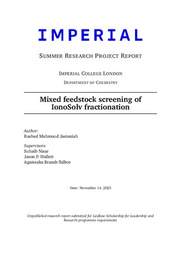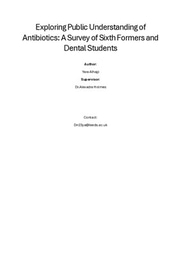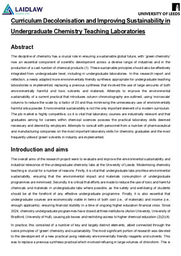Food for Thought

Breakfast
Rush hour begins at 8am. I wake up late.
I blame this on two things: 1) late-night debriefs with my lovely flatmates in our kitchen, and 2) the Scottish sun's refusal to set at a reasonable hour, skewing my sense of time. Time is a construct, apparently so is sleep.
I get out of bed exhausted, with exactly 1 hour to do everything including hitting snooze on my alarm, packing my bag, picking an outfit worthy of being hidden under my lab coat, listening to Katseye’s new EP, scrolling on Instagram, replying to texts, making lunch, and (theoretically) eating breakfast. This is, naturally, unrealistic. But I am an overachiever (#Laidlawscholar), so I try anyway. This results in me sacrificing what people say is the most important meal of the day- breakfast.
Now the lack of breakfast may not pose an issue for most people. But if you are prone to getting ‘hangry’ easily and have to pipette things for hours in the lab after, it presents a mammoth problem. I was always envious of my lab partner- disciplined and composed, she used to eat breakfast daily. However, "as much as people refuse to believe it, the company you keep does have an impact and influence on your choices" (Arostegui).
So, my lack of punctuality has- unfortunately, rubbed off on her and now neither of us eats breakfast. It is a non-zero-sum game.
How does this impact my research? My brain works at half its original capacity (which was not spectacular to begin with). The limited cognitive power I have is spent thinking about lunch, resulting in me staring blankly at my supervisor in the lab. I am lucky he is extremely patient and repeats things- he probably has breakfast.
Lesson 1- try to eat breakfast.
Lunch
The first 3 weeks were ‘food goals’. Every Sunday I bought smoked salmon trimmings from Aldi, a bag of green veggies (baby spinach, spring greens, or whatever was on clearance), reduced bread (Tesco’s finest!), pesto or yoghurt and EVOO sauce, and made the most delectable sandwiches. I watched people look at my sandwich in admiration and lived for that ego boost…which now that I think about, is pitiful- I derived validation from strangers in the Med Café.
Anyhow, I looked forward to lunch. It was time well spent- eating good food and watching videos on plasmids and recombinant DNA. Most importantly, it was a good break from the lab.
When I didn't get time to make lunch I could always depend on the medicine cafeteria to provide. Until I couldn’t.
13th June- the turning point in my Laidlaw food journey.
That was the day the med café shut.
Its closure marked the start of my slow decline. Grocery shopping became a distant memory. Most days, I did not have time for lunch, owing to my lab experiments, and when I did, the most attractive option was the white chocolate chip cookies from Tesco. Nutrition became a foreign concept, known only to my bacteria. They thrived, nourished in TSB- a broth that helps their growth, while I survived on sugar and adrenaline. I realized I had reached a low point when the prospect of having University Hall catered food in September made me ecstatic.
Which leads to lesson 2 (a hunger induced revelation)- nutrition is a myth. You only need adrenaline and cookies.
Dinner
Returning to the kitchen after a long day in the lab for dinner became the highlight of my summer.
My flatmates and I often cook together, making the most elaborate meals- Thai green curry, spinach and walnut pasta, summer rolls, and lentil dhal to name a few. The food is heavenly. However, on introspection, it is not the food that I crave. It is the company.
Our traditions of pancakes and French toast on rainy Sundays, or mint tea and late-night ‘tea-briefs’, are absolutely ‘joyful’ (in my flatmate’s words), and help me recharge for the busy week ahead. Sharing our struggles gives me consolation in knowing that everyone is in the same boat, and talking to others helps me learn and broaden my perspectives.
 Cakes, chords, and crepes!
Cakes, chords, and crepes!
Lesson 3- Research may rely on data and diligence, but it is held together by flatmates who encourage you through failed experiments and always know when to put the kettle on.
Post-dinner Stroll (reflecting while digesting)
Research is not just about experiments and data. It requires time, sacrifice, and occasionally crying in the lab over a failed PCR. The simplest discoveries often come from years of work, missed meals, failed experiments, frustration, and most importantly- passion.
As a student researcher, I do not know if my project will change the world. But it has definitely changed me. This summer has tested my patience, resilience, and ability to cook without supervision. It has taught me how to deal with failure, eat better, and laugh more often. The friends I’ve made this summer and the exposure I’ve gained are incomparable, and although my breakfast may still be missing, everything else is present and perfect.
References
Arostegui, Diana. “Christopher Ferry - Motivational Entrepreneur | Digital Marketer.” Pinterest, 8 July 2021, pin.it/4zS24tZ3b. Accessed 3 July 2025.





Please sign in
If you are a registered user on Laidlaw Scholars Network, please sign in